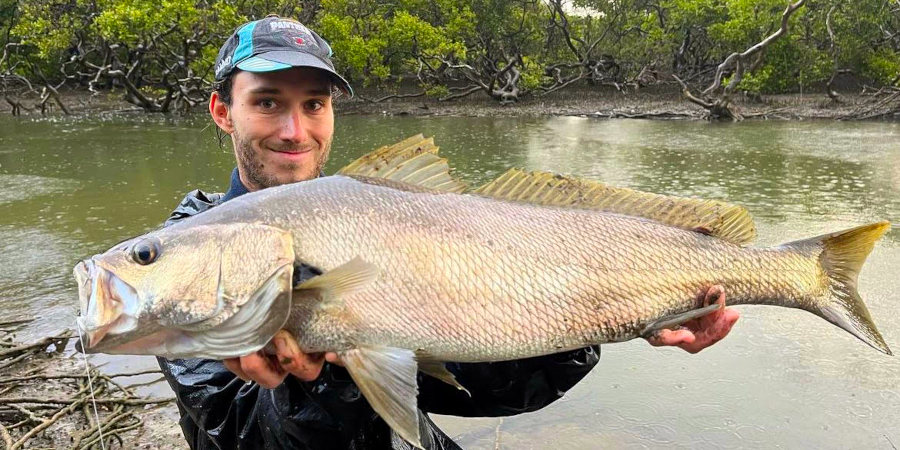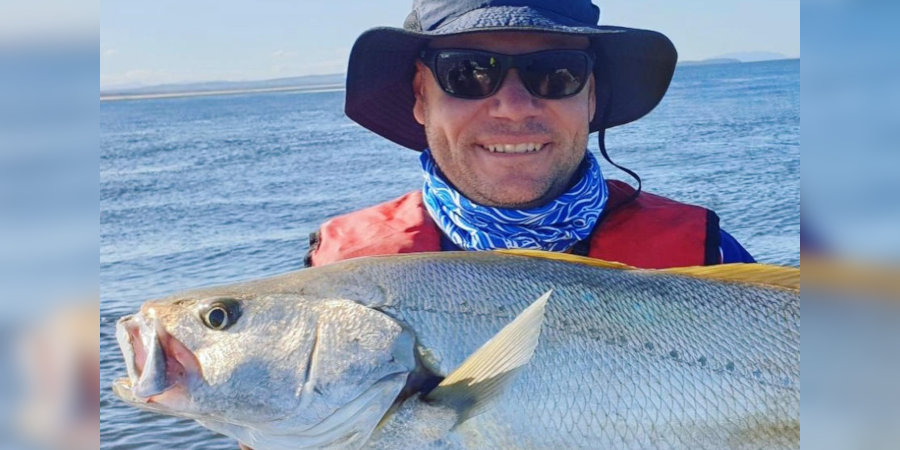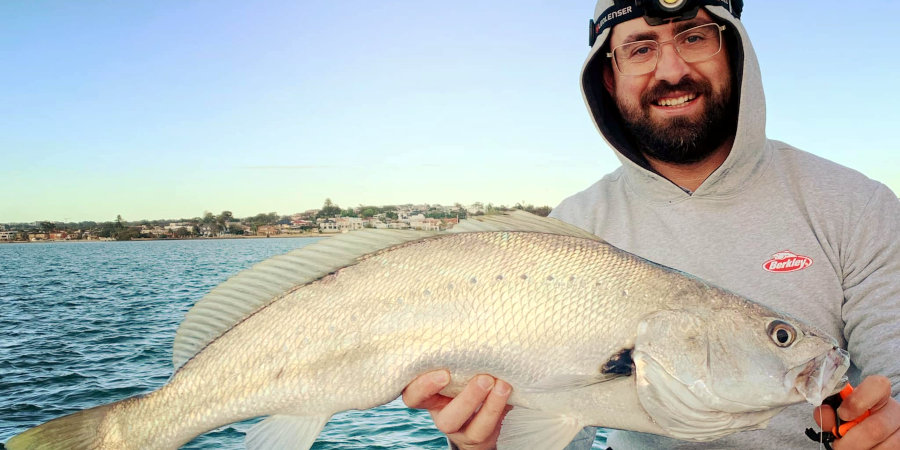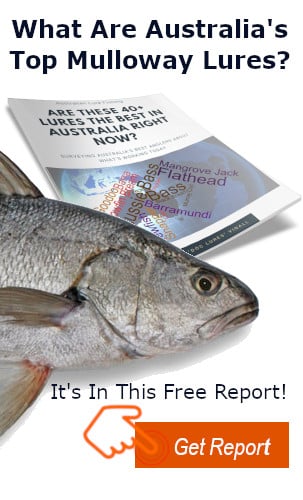
Dan Mackrell
Sponsored Tournament Angler
Dan is a very successful Victorian bream tournament angler of around 12 years with a reputation for being able to take a solid bag of bream even in the toughest of conditions. When he’s not targeting bream, Dan has spent plenty of time figuring out the mulloway fishery – tips he shares in this interview.
Dan’s Top Tips For Glenelg River Mulloway Fishing
- Mulloway (jewfish) are the apex predator of southern estuaries and are more common in South West Victorian systems than most people realise. Those who take the time to target them will find consistent numbers.
- The Glenelg is a big system and mulloway travel the full 70km of the tidal reaches. Dan finds the areas nearer the mouth have structure and tidal currents that hold bait making them more consistent for the mulloway enthusiast.
- Periods leading up to full and new moons have greater tidal movement, and while the tides are much smaller down south than across northern Australia, picking the bigger tides will help with finding jewfish.
- Periods with lots of dirty freshwater can be prime mulloway bites. The Glenelg is a salt wedge estuary, meaning there can be seawater sitting beneath the dirty freshwater and mulloway will hold in that.
- Modern sonar technology has a lot to do with jewfish becoming a more consistent lure fishing target. Finding schools of fish and identifying the active ones using sidescan is very effective.
- “Elephants eat peanuts!” Dan finds that small lures catch plenty of mulloway in the Glenelg system.
- When the mulloway start to appear as a bycatch it’s often a sign that the bream are about to go off the bite, so if you’re targeting bream it may be time to switch your focus.
Dan’s Mulloway Fishing Tackle
- Most mulloway in the Glenelg system are in the 70-100cm range and being clean fighters are usually easily played out even when hooked as a bycatch while bream fishing.
- When specifically targeting mulloway Dan uses a 3-5kg rod, 2500 size reel with 6-8lb braid and a 6-8 lb Unitika fluorocarbon leader. Most fish are lip-hooked , so abrasion of the leader is generally minimal.
Dan’s Top Mulloway Fishing Lures
-
The Bassday Sugardeep is a great hard-bodied jerkbait that definitely tempts more than its share of Glenelg jewfish. Most mulloway fishing in this system is in 3-4m of water, so dan likes to find fish using his sounder, then spot lock his electric motor downstream and make casts over the fish. This makes the lure run with the current and into the facing fish. The Sugardeep is a suspending lure (fine tune it with hook changes or sticky weights), twitch it back and leave plenty of pauses between twitches – not dissimilar to a barra retrieve, for those who chase barra! Fish usually take the lure savagely on the pause. This lure and technique is particularly effective when you find mulloway up off the bottom and likely to be actively feeding.
-
The Bassday Range Vibe is a small, hard body vibration bait and is a good choice when fish are staying close to the bottom and are a little more lazy. Cast the lure up-current of the fish and allow it to sink to the bottom until the line relaxes. Raise the lure with a slow rod lift, just enough to feel the lure vibrate, then allow it to sink to bottom and for the line to relax again. Most bites come as the lure is dropping back down to bottom.
-
A 3” Paddle Tail grub on a 1/16 oz jig head works well on Glenelg mulloway and will encourage a bycatch of bream at times. Size the hooks up a little if mulloway are the primary target. Atomic Plazos or Zman paddletails are good options. Fish these lures similar to the Range Vibe, but with a more erratic retrieve to fish that are staying close to bottom. Inserting one of the small Trick Bits glass rattles into the plastic is a good ploy when the fish are playing hard to get.

Mastering Land-based Mulloway Fishing In Botany Bay
Land-based fishing in Botany Bay can be more productive than many anglers would ever imagine. Local Gun Tom Munro explains how he’s figured out the local mulloway population and now consistently targets them on soft plastic lures.

Fishing At Forster: 5 Top Spots With Local Gun Luke Austin
The fishing at Forster – Tuncurry is superb, all year round with numerous options for land-based and boating anglers alike. Luke Austin has lived there all his life and shares some great spots for visiting anglers and locals alike.

Matt Poulos’ Georges River Fishing Secrets: Jewfish On Lures
This interview about Georges River Fishing is ALF EPISODE 642 Check out our Lure Fishing archives for more information on Botany Bay Fishing Spots and Jewfish Fishing Matthew Poulos High Tide Tours Matt is a Georges River fishing gun, having grown up tossing baits and...

Mastering Land-based Mulloway Fishing In Botany Bay
Land-based fishing in Botany Bay can be more productive than many anglers would ever imagine. Local Gun Tom Munro explains how he’s figured out the local mulloway population and now consistently targets them on soft plastic lures.

Fishing At Forster: 5 Top Spots With Local Gun Luke Austin
The fishing at Forster – Tuncurry is superb, all year round with numerous options for land-based and boating anglers alike. Luke Austin has lived there all his life and shares some great spots for visiting anglers and locals alike.
Dan’s Sponsors
- Frogleys Offshore are the Australian distributors for Atomic Lures, Sumurai Rods, Gamakatsu hooks and Bassday lures.
- Mako Eyewear Australia is Dan’s preferred brand of polarised sunglasses – vital for fishing the flats and offshore.



You guys often talk about using fish finders when lure fishing and I want to know if it is necessary to have one to be able to be successful straying of with lures?
Thanks
Hi Albert, great question! The short answer is “no, it’s not necessary to have a fish finder to catch fish on lures”. That said, I reckon you’d have to fight most of my podcast guests pretty hard to get them to give their sounders up. Fish finders can take a lot of guesswork and unknowns out of fishing, especially in storages or on the ocean. If you’re fishing without one you need to focus on other signals such as working birds, obvious structure, current lines, weed edges and so on, depending on the style of fishing you’re doing. There are some species and situations where a sounder is less important and others where it’s very hard to do without. If you don’t have one, don’t let it stop you, skills you develop for finding fish are still valuable, even if you do eventually end up with a sounder